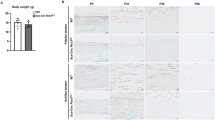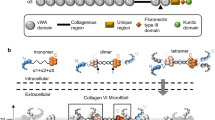Abstract
IT was recently reported that certain established lines of mouse fibroblasts, capable of indefinite propagation in culture1, were able to synthesize appreciable quantities of collagen2. The collagen appeared as extracellular fibres of characteristic periodicity between cells growing in multiple layers on the surface of a Petri dish. This communication examines the temporal relationship between cell growth and the expression of this differentiated function.
This is a preview of subscription content, access via your institution
Access options
Subscribe to this journal
Receive 51 print issues and online access
$199.00 per year
only $3.90 per issue
Buy this article
- Purchase on SpringerLink
- Instant access to full article PDF
Prices may be subject to local taxes which are calculated during checkout
Similar content being viewed by others
References
Todaro, G., and Green, H., J. Cell Biol., 17, 299 (1963).
Goldberg, B., Green, H., and Todaro, G., Exp. Cell Res., 31, 444 (1963).
Prockop, D. J., and Udenfriend, S., Anal. Biochem., 1, 228 (1960).
Author information
Authors and Affiliations
Rights and permissions
About this article
Cite this article
GREEN, H., GOLDBERG, B. Kinetics of Collagen Synthesis by Established Mammalian Cell Lines. Nature 200, 1097–1098 (1963). https://doi.org/10.1038/2001097a0
Issue date:
DOI: https://doi.org/10.1038/2001097a0
This article is cited by
-
Kinetic analysis of experimental post-operative peritoneal healing: The incorporation of proline and glucosamine by exudative and tissue repair cells
The Japanese Journal of Surgery (1991)
-
Biosynthesis of various types of collagen by human hepatoma cells in vitro
Virchows Archiv B Cell Pathology Including Molecular Pathology (1985)
-
Some aspects of the modulation and regulation of collagen synthesis in vitro
Molecular and Cellular Biochemistry (1981)
-
Collagen synthesis in normal BHK cells and temperature-sensitive chemically transformed BHK cells
In Vitro (1979)
-
Collagen synthesized and modified by aging fibroblasts in culture
In Vitro (1975)



